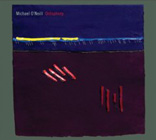Home » Jazz Articles » Album Review » Michael O'Neill: Ontophony
Michael O'Neill: Ontophony
Bagpipes don't have so ancient a history in Scotland, contrary to common misapprehensions. The bagpipe arrived relatively late by general European standards, but the creation of a very distinctive Scottish instrument and music soon followed: they sound different from other bagpipes because they are different, and for complex reasons they seem to have taken on a major role in aristocratic court music.
The Scottish instrument's by no means to be equated simply with the pipe band and touristic drivel passed off not least on North Americans. The oriental parallels which receive glancing reference in the pages of this set's booklet aren't fanciful. Links between Indo-European art of far Northwestern Europe and the Indian subcontinent are hardly impossible. Some pipers have long been interested in raga, even playing it. Brigadoon's a Hollywood Hell!
The present set is comprised of one suite performed by four pipers, I think never more than three at the one time, with tabla and cymbals. It includes two sections, Being and Doing, each itself comprised by separate sub-sections. I lack time and space to discuss the physics or logistics of three-bagpipe harmony, but I wouldn't rule out ancient Scottish parallels as regards some aspects of the metaphysics.
Of the other items, "Luffness" begins with the sound of an oriental flute and continues with harmonising bagpipes, whose tuning has been altered by lengthening the "drones" (the upward pointing pipes which play constant notes), and percussion. A dance-like rhythm takes over. "Jedaya" is for two pipers with a huge array of rhythm instruments and the didgeridu, and its ideal of metaphysical sea music is not necessarily all that remote from the traditional classical piobaireachd (spelled phonetically "pibroch").
"Horse of a Different Colour" is founded on a traditional form with sophisticated compositional development. Described as a cross between traditional sextet and traditional quartet approaches, it might represent Michael O'Neill without his other blowing collaborators, audible fivefold on one set of pipes? I'm not sure it's five, since he's also listed as a percussionist. Amid alternations between what wouldn't sound unusual from a standard pipe band and the superficially not unattractive new music here, the most startling moment is the most sheerly traditional burst of music.
I don't feel guilty, awkward or in dereliction of duty, not knowing quite what to make of for instance a rapprochement of Japanese music with Scottish bagpipes. (Ages ago I inherited the pipes of a Scottish Highland musician who was on the first British military mission to Japan: my great grandfather.) If the initial complex tradition's more interesting and musically superior (founded on music initially made on other instruments) to a lot of better-known things, this set might overturn enough popular misconceptions to direct attention toward it. This music was well worth making, and I'm pleased to have had the chance to get to know it.
Track Listing
Being and Doing; A Walk Supreme; Migration of a Triad; Ontophony; The Shiftings; Astralis; Ogdoadic Zone; Re-entry; Luffness; Jedaya; Horse of a Different Colour.
Personnel
Mearingstone: Michael O'Neill: bagpipes, percussion; Andrew Bonar, Andrew Douglas, Andrew Hayes: bagpipes; Uzume Taiko, Bonnie Soon, Boyd Seiichi Grealy, Jason Overy: taiko, percussion; Neelamjit Dhillon: tabla; Alcvin Ramos: shakuhachi; Duncan Millar: snare drum.
Album information
Title: Ontophony | Year Released: 2007 | Record Label: Songlines Recordings
Tags
PREVIOUS / NEXT
Support All About Jazz
 All About Jazz has been a pillar of jazz since 1995, championing it as an art form and, more importantly, supporting the musicians who make it. Our enduring commitment has made "AAJ" one of the most culturally important websites of its kind, read by hundreds of thousands of fans, musicians and industry figures every month.
All About Jazz has been a pillar of jazz since 1995, championing it as an art form and, more importantly, supporting the musicians who make it. Our enduring commitment has made "AAJ" one of the most culturally important websites of its kind, read by hundreds of thousands of fans, musicians and industry figures every month.


















